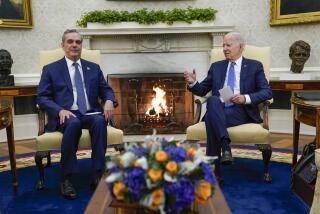Cuba’s cage
Fidel Castro wasn’t invited to the Summit of the Americas to be held in Trinidad and Tobago this week, but he may be able to dominate it nonetheless and humiliate the United States for its globally rejected policy toward Cuba.
Many Latin American presidents have implied that, at the summit, they will urge President Obama to end the U.S. trade embargo on Cuba. And they will not be pacified by the changes announced Monday by Obama, even though the changes go beyond his campaign promises.
The Latin American presidents will tell Obama that Washington’s policy toward Cuba is a counterproductive Cold War relic that inhibits cooperation and feeds anti-Americanism throughout the region; that it has been maintained by politicians who are overly influenced by militants within the tiny but powerful Cuban American community; and that this Miami embargo lobby seeks vengeance against Castro, which does not serve the broader interests of the hemisphere. And they will be largely right.
Rep. Barbara Lee (D-Oakland) reports from her meetings last week with Fidel and Raul Castro in Havana that both are eager for unconditional talks with Washington about improving bilateral relations.
Raul, yes. Fidel, perhaps, though his career has been defined by confrontation with Washington. Fidel Castro may have changed, but it is at least as likely that he expects any significant reform Obama proposes will be shot down by those in Congress who support or don’t want to fight with the Miami lobby or their Cuban American congressional colleagues. That would give Castro the moral high ground.
If major reforms do seem imminent, the question then is: Will he allow rapprochement, or have the power to prevent it?
Castro has “vetoed” U.S. moderation in the past, as in 1996, when he almost certainly ordered the shooting down of two small planes belonging to a Miami-based Cuban exile group over international waters. That predictably resulted in a furious U.S. Congress passing the Helms-Burton Act, which strengthened the embargo and prohibited normalizing relations until Cuba undertakes many mainly political reforms that the U.S. requires from no other country. Helms-Burton is still the twisted centerpiece of U.S. policy today.
While Cuban American militants insist that they alone are punishing Castro and promoting democracy and freedom in Cuba, the reality is that they have aided his cause. For decades, the embargo has given him a scapegoat to blame for all of his domestic and international actions and catastrophes.
So how much will Obama try to do immediately, given the historical intransigence of militants in Miami and their Washington allies, some of whom may sincerely believe they are righteous in backing an embargo many admit hasn’t worked for years? Washington has spent many millions of dollars presumably promoting democracy in Cuba, but a report last year by the most important Cuban exile group, the Cuban American National Foundation, or CANF, found that more than 80% of it was spent within the United States. The Congressional Research Service has reported that the two largest U.S. recipients of this money have been or are being investigated for misuse of funds.
The hopeful news is that there are clear signs that the Miami lobby is coming apart. A Florida International University poll in late 2008 showed that, for the first time, a majority of Cuban Americans in the Miami area -- 55% -- oppose the embargo, and 65% support establishing bilateral diplomatic relations. A CNN poll released Friday found that 70% of those Americans responding support lifting the embargo, and more members of Congress are coming around.
Last week, the CANF issued a document that concedes U.S.-Cuban policy under recent U.S. administrations, which it mostly supported, has been “little beyond posturing for domestic electoral purposes.” And on Monday, CANF’s president, Francisco “Pepe” Hernandez, backed Obama’s announcement, saying the changes would help Cubans “not only in economic terms but in terms of information and contacts with the outside world.” Hernandez was once a strong supporter of the travel ban.
This new objectivity within the Cuban American community and Congress should encourage Obama to go beyond Monday’s changes, which lift Bush administration restrictions on travel, remittances and items that are sent or carried to Cuba by Cuban Americans, and reduce restrictions on humanitarian donations and telecommunications links to the island. Short of the complicated task of immediately ending the embargo, the president can lift travel restrictions on all Americans, further liberalize trade relations, conduct discussions of migration, environmental and drug issues, and not oppose Cuba’s re-integration into the Organization of American States.
These are essential steps away from the propaganda-ridden policies of recent administrations. They will help improve U.S. relations in Latin America and test just how willing the Castro brothers are to move beyond 50 years of conflict with Washington and repression of the Cuban people.
More to Read
Sign up for Essential California
The most important California stories and recommendations in your inbox every morning.
You may occasionally receive promotional content from the Los Angeles Times.










